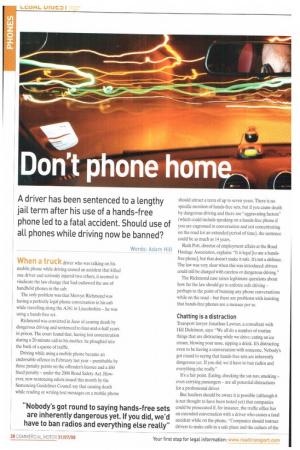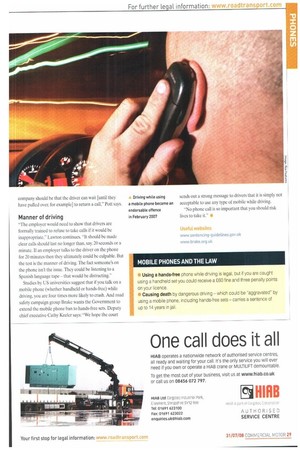A driver has been sentenced to a lengthy jail term
Page 28

Page 29

If you've noticed an error in this article please click here to report it so we can fix it.
after his use of a hands-free phone led to a fatal accident. Should use of all phones white driving now be banned?
Words: Adam Hill
When a truck driver who was talking on his mobile phone while driving caused an accident that killed one driver and seriously injured two others, it seemed to vindicate the law change that had outlawed the use of handheld phones in the cab.
The only problem was that Mervyn Richmond was having a perfectly legal phone conversation in his cab while travelling along the A361 in Lincolnshire he was using a hands-free set.
Richmond was convicted in June of causing death by dangerous driving and sentenced to four-and-a-half years in prison. The court found that, having lost concentration during a 20-minute call to his mother, he ploughed into the back of a queue of traffic.
Driving while using a mobile phone became an endorsable offence in February last year punishable by three penalty points on the offender's licence and a £60 fixed penalty under the 2006 Road Safety Act. However, new sentencing edicts issued this month by the Sentencing Guidelines Council say that causing death while reading or writing text messages on a mobile phone should attract a term of up to seven years. There is no specific mention of hands-free sets, but if you cause death by dangerous driving and there are "aggravating factors" (which could include speaking on a hands-free phone if you are engrossed in conversation and not concentrating on the road for an extended period of time), the sentence could be as much as 14 years.
Ruth Pott. director of employment affairs at the Road Haulage Association, explains: "It is legal [to use a handsfree phone]. but that doesn't make it safe. It's not a defence. The law was very clear when this was introduced: drivers could still be charged with careless or dangerous driving."
The Richmond case raises legitimate questions about how far the law should go to enforce safe driving perhaps to the point of banning any phone conversations while on the road but there are problems with insisting that hands-free phones are a menace per se.
Chatting is a distraction Transport lawyer Jonathan Lawton, a consultant with Hill Dickinson, says: "We all do a number of routine things that are distracting while we drive: eating an ice cream, blowing your nose, sipping a drink. It's distracting even to be having a conversation with someone. Nobody's got round to saying that hands-free sets are inherently dangerous yet. If you did, we'd have to ban radios and everything else really.
It's a fair point. Eating, checking the sat-nay, smoking even carrying passengers are all potential distractions for a professional driver.
But hauliers should be aware it is possible (although it is not thought to have been tested yet) that companies could be prosecuted if, for instance, the traffic office has an extended conversation with a driver who causes a fatal accident while on the phone. "Companies should instruct drivers to make calls in a safe place and the culture of the company should be that the driver can wait [until they have pulled over, for example] to return a call," Putt says.
Manner of driving "The employer would need to show that drivers are formally trained to refuse to lake calls if it would be inappropriate." Lawton continues. "It should be made clear calls should last no longer than, say, 20 seconds or a minute. If an employer talks to the driver on the phone for 20 minutes then they ultimately could be culpable. But the test is the manner of driving. The fact someone's on the phone isn't the issue. They could be listening to a Spanish language tape — that would be distracting."
Studies by US universities suggest that if you talk on a mobile phone (whether handheld or hands-free) while driving, you are four times more likely to crash. And road safety campaign group Brake wants the Government to extend the mobile phone ban to hands-free sets. Deputy chief executive Cathy Keeler says: "We hope the court sends out a strong message to drivers that it is simply not acceptable to use any type of mobile while driving. "No phone call is so important that you should risk lives to take it." II
Useful websites
www.sentencing-guidelines.goviik www.brake.org.uk
































































































































































